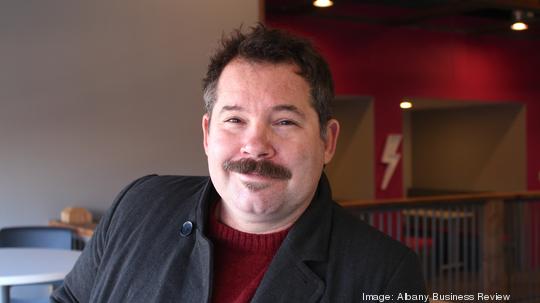
Glenn Fiedler first flew from Los Angeles to Troy for business in mid-2019.
Later that year, he got a one-way ticket, and Troy became the new base for his gaming tech startup, Network Next.
He had been visiting to do some work with Velan Studios on its game Knockout City, when Velan founders Guha Bala and Karthik Bala clued him into the cluster of game studios in the Capital Region.
“Guha and Karthik enticed me purely on the merits of the region to move here. They personally convinced me to move my company here,” Fiedler said. "There's actually a massive game development cluster being built up in upstate New York. It's very unknown outside of the region."
Fiedler normally worked from his office in Santa Monica, which was near the rent-controlled, one-bedroom apartment he shared with his wife, daughter and three cats. After 16 years in LA, Fiedler decided: "I want my daughter to grow up and have a backyard and have a dog. LA is just not built for that."
Fiedler spent his first few months in Troy working out of an office in the Troy Innovation Garage before Covid hit and his startup went fully remote. He lived in an Airbnb for six months before finding a more permanent residence in East Schodack.
Fiedler grew up and started his work in the game industry in Australia. His mother is American, so he has dual citizenship. He then moved to LA and worked for a few big-name studios: Pandemic Studios, Sony’s Santa Monica Studio and Respawn Entertainment.
He spent about 10 years of his career working on multiplayer games, which is where he encountered a problem that led to the creation of his startup, Network Next.
The startup has created software and a service that can strengthen internet performance for applications that require real-time interaction, like multiplayer video games.
He said the technology is able to steer internet traffic from its origin directly to its proper destination.
Right now, information may travel from one server to another, which can cause lag and loss of data between endpoints. If the lag is bad enough, it could lead to lower retention, lower engagement with the product and less money spent.
"The internet doesn't steer the traffic the right way, and we make it go the right way," Fiedler said. "The internet just isn't built for these real-time applications."
The software is integrated into the game, and every 10 seconds, it determines the best route for data. The data network with the best route then gets a payment from the startup on behalf of the game developer. The startup bills the developer monthly based on how much the service was used.
"So we're actually in the business of creating an incentive, where there isn't actually an incentive today,” Fielder said. "Our business strategy is to work with all the game developers that we can. That creates buying power, and then the networks compete."
He has about 10 customers right now.
More than just games, he says the Network Next application would be useful in video chat and the developing metaverse.
Network Next has previously raised about $5 million and is working on another round now, which Fiedler plans to deploy in the Capital Region.
The startup has 15 employees, most of them in upstate New York. He plans to hire 20-30 new employees in the next year, at least 10 in the Capital Region, and they'll be able to meet infrequently at the Troy Innovation Garage.
Fiedler said the pay doesn’t change based on the employee’s region. Unlike in LA, he’s found that employees here can afford to buy a house, and they don’t have to deal with long commutes.
"I have a strong preference to hire locally in the Capital Region, especially with Rensselaer Polytechnic Institute. The engineers coming out of that university — it's a fantastic source of talent. If we do it right, we can hire people who are educated here and then keep them in the region,” Fielder said.
"I really want to see Troy continue as a game development hub upstate, becoming something sort of like how Montreal is right now."



